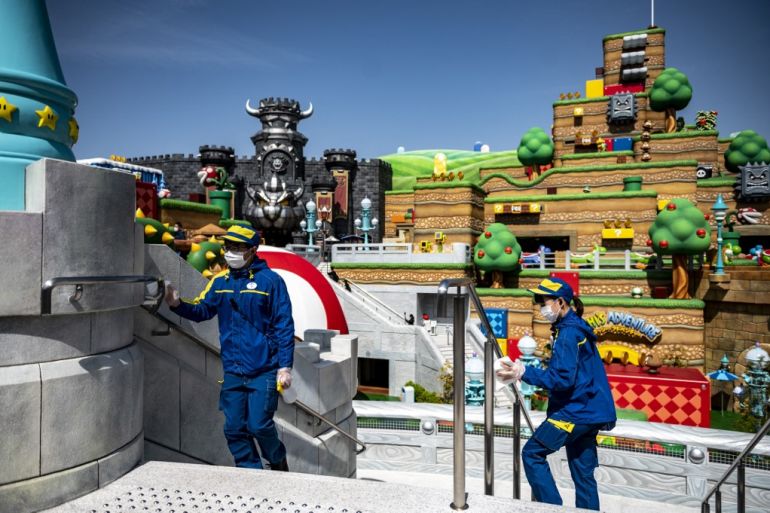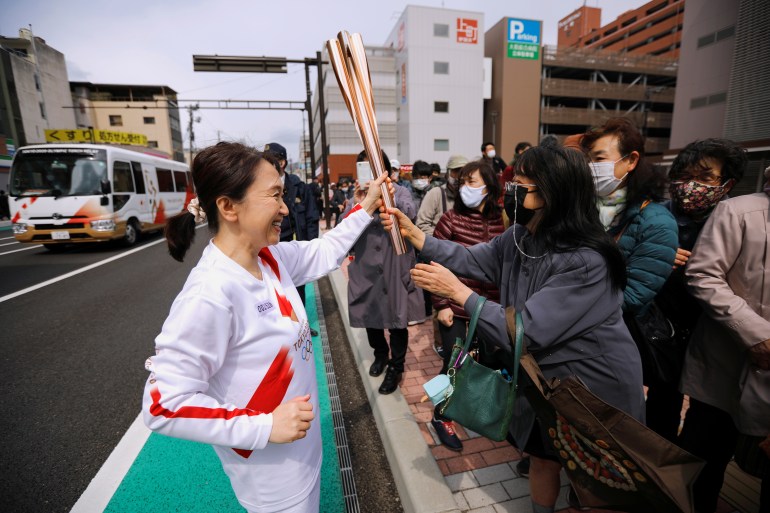Japan PM says Olympic torch relay in Osaka cancelled
The move comes after emergency measures were imposed in the western region to halt a rebound in COVID-19 cases.

Japanese Prime Minister Yoshihide Suga says the Olympic torch relay scheduled in the city of Osaka has been cancelled amid a resurgence in COVID-19 cases.
Earlier on Thursday, Osaka Governor Hirofumi Yoshimura had called for the Olympic torch events to be cancelled.
Keep reading
list of 3 itemsOverseas fans banned from Tokyo Olympics, Paralympics
Tokyo 2020 official quits in ‘Olympig’ jibe at female comedian
The move comes after emergency measures, including shortening business hours and asking people to work from home and refrain from activities like karaoke, were imposed earlier in the western region of Osaka to halt a rebound in COVID-19 cases.
The infection control measures will cover the prefectures of Osaka, Hyogo, and Miyagi and will last from April 5 until May 5, said economy minister Yasutoshi Nishimura, who also heads the nation’s COVID-19 response.
New infections in Osaka have exceeded those of the much larger metropolis of Tokyo in recent days, imperilling the 2020 Games.
Osaka prefecture reported 599 new cases on Wednesday, close to the record of 654 in early January when the nation was in the grip of its third and most deadly wave of the pandemic. Tokyo reported 475 new infections today, the most since February 10.
The new measures are based on a revised infection control law and can be applied to a narrower area than a state of emergency, which Suga declared for most of the country in early January.
Sharp rebound of cases
The controls allow regional governments to order businesses to shorten hours and to impose fines of 200,000 yen ($1,806.52) or publish the names of those who do not comply. Additionally, residents are being asked to telework and to refrain from activities like karaoke.
Osaka emerged early from the state of emergency but then experienced a sharp rebound in cases towards the end of March.
“In Osaka, in particular, the number of infected individuals in their 20 and 30 is increasing as people continue to go out at night,” Chief Cabinet Secretary Katsunobu Kato said on Thursday.
“Reports of mutant strains are also increasing, and the contagion is expected to continue.”
The torch relay for the Tokyo Olympics was scheduled to go through Osaka prefecture from April 13 to 14.

The relay began last week in Fukushima and is being seen as the first major test for the Games when it comes to holding a large-scale event while implementing stringent health protocols.
Tokyo Olympics organisers are requiring roadside spectators to wear masks, practise social distancing and not cheer out loud to prevent the spread of the virus, and there have been no reports so far of infections arising from the relay.
Nagano prefecture barred spectators from parts of the relay on Thursday, however, in a move aimed at preventing large groups from gathering after its capital city raised its COVID-19 alert level following a recent rise in infections.
No spectators will be present when the last relay runner of the day brings in the torch and lights the Olympic cauldron in Nagano City, the prefecture said.
Although Japan has been affected by the pandemic less severely than the United States and Europe, its vaccination campaign is off to a slow start while some prefectures are seeing an uptick in new infections.
Most Japanese oppose holding the Games this summer during the pandemic, surveys have shown.
Olympic organisers last month decided to bar international spectators from the Games, and this month are due to decide on the maximum capacity for spectators in venues.
The Olympics, postponed by a year because of the pandemic, are scheduled for July 23 to August 8 and the Paralympics from August 24 to September 5.